HRM Report: HRM, Development, Performance in Alexandra Reisse
VerifiedAdded on 2021/02/19
|23
|6665
|24
Report
AI Summary
This report delves into the core concepts of Human Resource Management (HRM), focusing on the essential skills, knowledge, and behaviors expected of HR professionals within the context of Alexandra Reisse. It meticulously examines the value of continuous professional development, highlighting the importance of personal skill audits and the creation of professional development plans. The report further analyzes the critical factors influencing inclusive learning and development to drive sustainable business performance, differentiating between learning, training, and development. It explores the significance of collaborative working and performance management, detailing the components of effective performance management and its impact on organizational, team, and individual learning. Additionally, the report critically analyzes different performance management approaches, their effectiveness, the role of organizational culture, and the potential of performance management in organizational transformation. The report provides a comprehensive overview of HRM practices and their impact on organizational success.
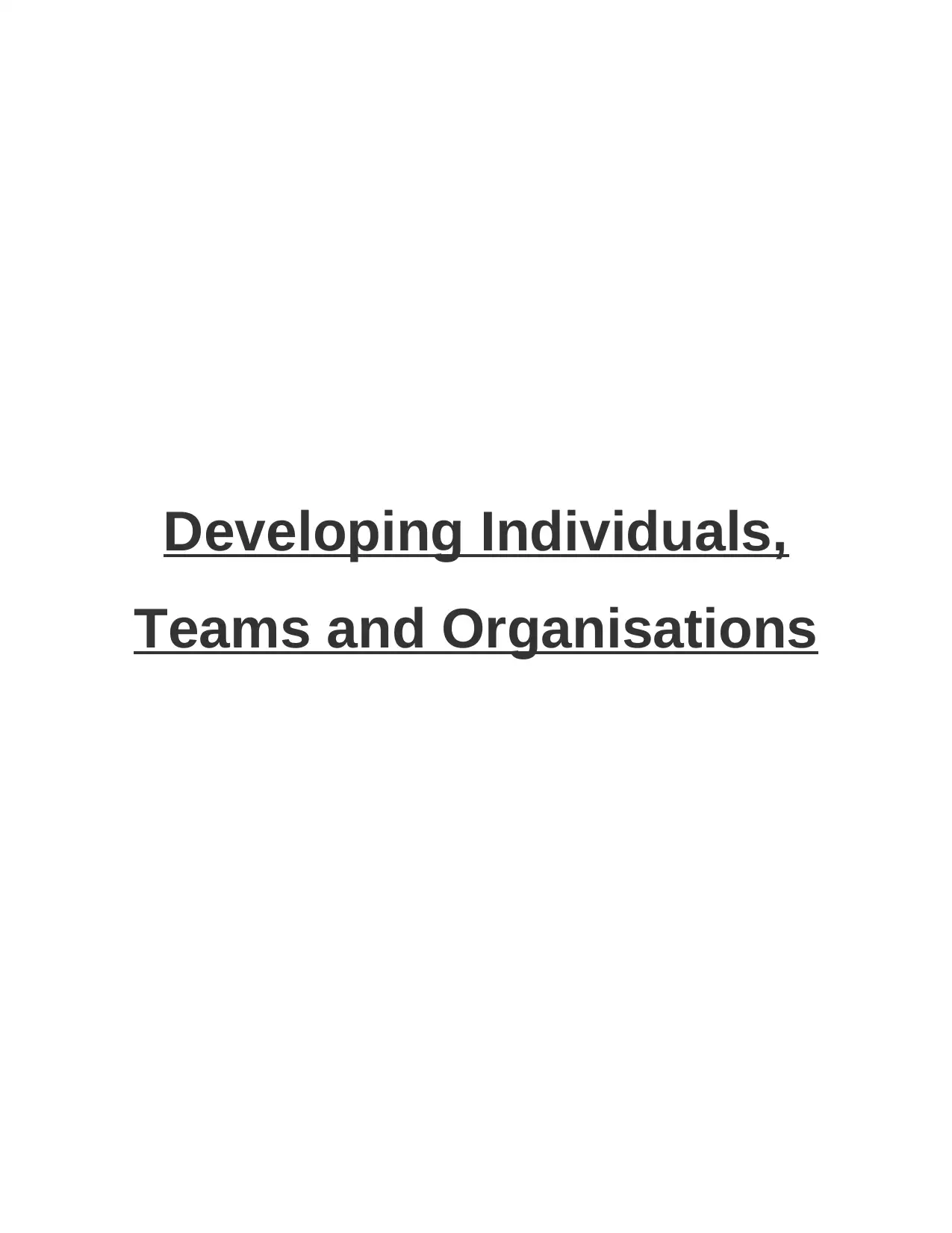
Developing Individuals,
Teams and Organisations
Teams and Organisations
Paraphrase This Document
Need a fresh take? Get an instant paraphrase of this document with our AI Paraphraser
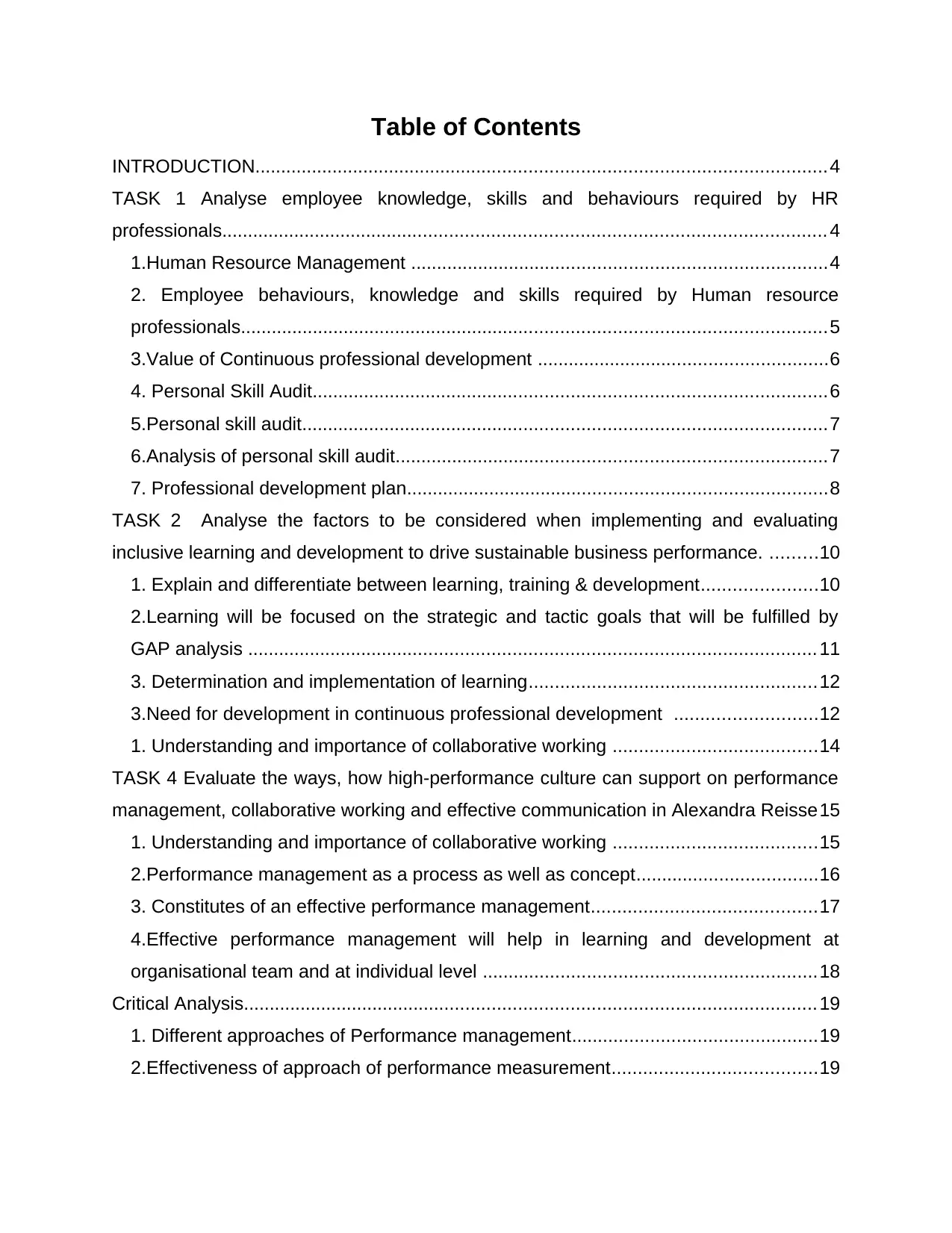
Table of Contents
INTRODUCTION..............................................................................................................4
TASK 1 Analyse employee knowledge, skills and behaviours required by HR
professionals.................................................................................................................... 4
1.Human Resource Management ................................................................................4
2. Employee behaviours, knowledge and skills required by Human resource
professionals.................................................................................................................5
3.Value of Continuous professional development ........................................................6
4. Personal Skill Audit...................................................................................................6
5.Personal skill audit.....................................................................................................7
6.Analysis of personal skill audit...................................................................................7
7. Professional development plan.................................................................................8
TASK 2 Analyse the factors to be considered when implementing and evaluating
inclusive learning and development to drive sustainable business performance. .........10
1. Explain and differentiate between learning, training & development......................10
2.Learning will be focused on the strategic and tactic goals that will be fulfilled by
GAP analysis ............................................................................................................. 11
3. Determination and implementation of learning.......................................................12
3.Need for development in continuous professional development ...........................12
1. Understanding and importance of collaborative working .......................................14
TASK 4 Evaluate the ways, how high-performance culture can support on performance
management, collaborative working and effective communication in Alexandra Reisse15
1. Understanding and importance of collaborative working .......................................15
2.Performance management as a process as well as concept...................................16
3. Constitutes of an effective performance management...........................................17
4.Effective performance management will help in learning and development at
organisational team and at individual level ................................................................18
Critical Analysis..............................................................................................................19
1. Different approaches of Performance management...............................................19
2.Effectiveness of approach of performance measurement.......................................19
INTRODUCTION..............................................................................................................4
TASK 1 Analyse employee knowledge, skills and behaviours required by HR
professionals.................................................................................................................... 4
1.Human Resource Management ................................................................................4
2. Employee behaviours, knowledge and skills required by Human resource
professionals.................................................................................................................5
3.Value of Continuous professional development ........................................................6
4. Personal Skill Audit...................................................................................................6
5.Personal skill audit.....................................................................................................7
6.Analysis of personal skill audit...................................................................................7
7. Professional development plan.................................................................................8
TASK 2 Analyse the factors to be considered when implementing and evaluating
inclusive learning and development to drive sustainable business performance. .........10
1. Explain and differentiate between learning, training & development......................10
2.Learning will be focused on the strategic and tactic goals that will be fulfilled by
GAP analysis ............................................................................................................. 11
3. Determination and implementation of learning.......................................................12
3.Need for development in continuous professional development ...........................12
1. Understanding and importance of collaborative working .......................................14
TASK 4 Evaluate the ways, how high-performance culture can support on performance
management, collaborative working and effective communication in Alexandra Reisse15
1. Understanding and importance of collaborative working .......................................15
2.Performance management as a process as well as concept...................................16
3. Constitutes of an effective performance management...........................................17
4.Effective performance management will help in learning and development at
organisational team and at individual level ................................................................18
Critical Analysis..............................................................................................................19
1. Different approaches of Performance management...............................................19
2.Effectiveness of approach of performance measurement.......................................19
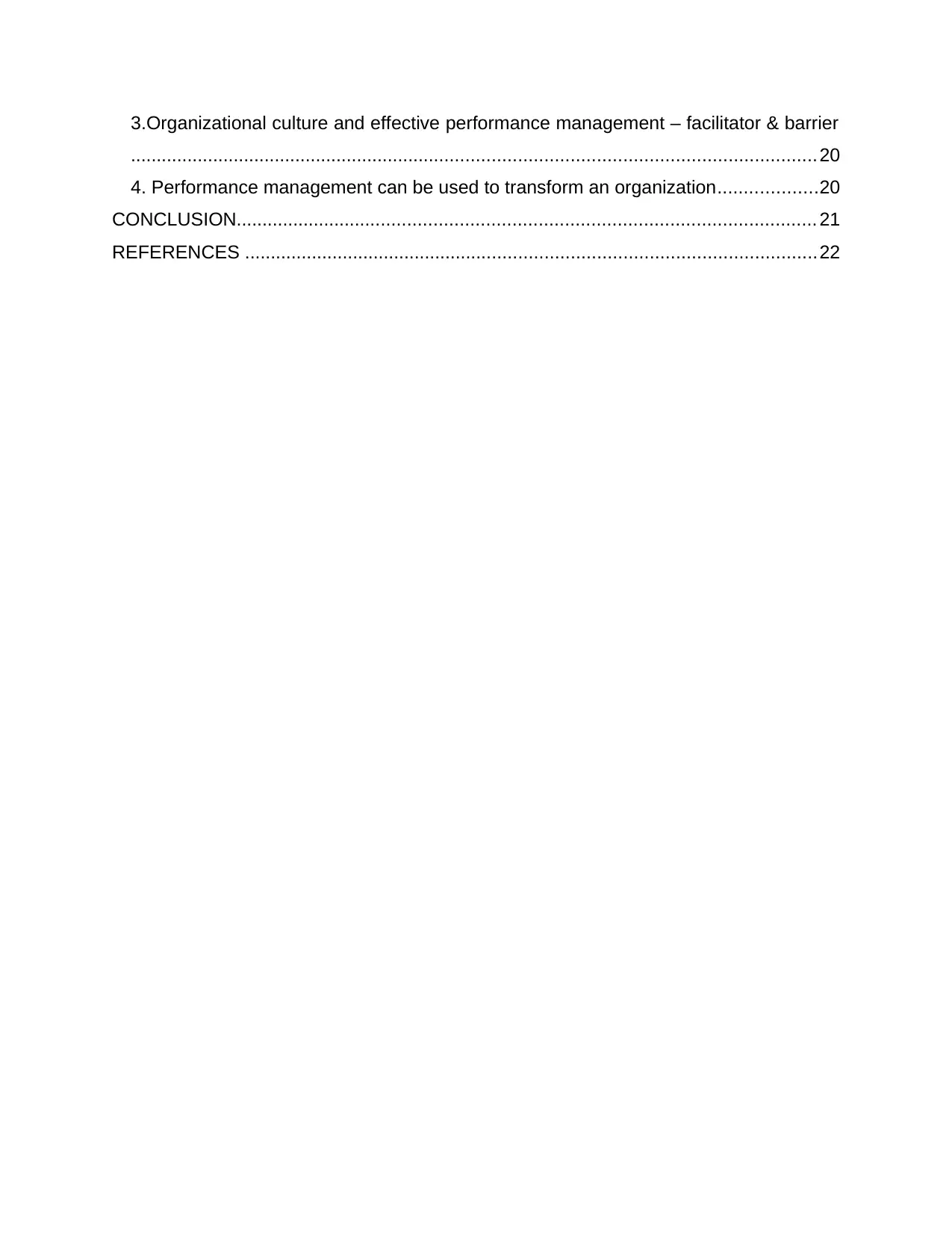
3.Organizational culture and effective performance management – facilitator & barrier
....................................................................................................................................20
4. Performance management can be used to transform an organization...................20
CONCLUSION............................................................................................................... 21
REFERENCES ..............................................................................................................22
....................................................................................................................................20
4. Performance management can be used to transform an organization...................20
CONCLUSION............................................................................................................... 21
REFERENCES ..............................................................................................................22
⊘ This is a preview!⊘
Do you want full access?
Subscribe today to unlock all pages.

Trusted by 1+ million students worldwide
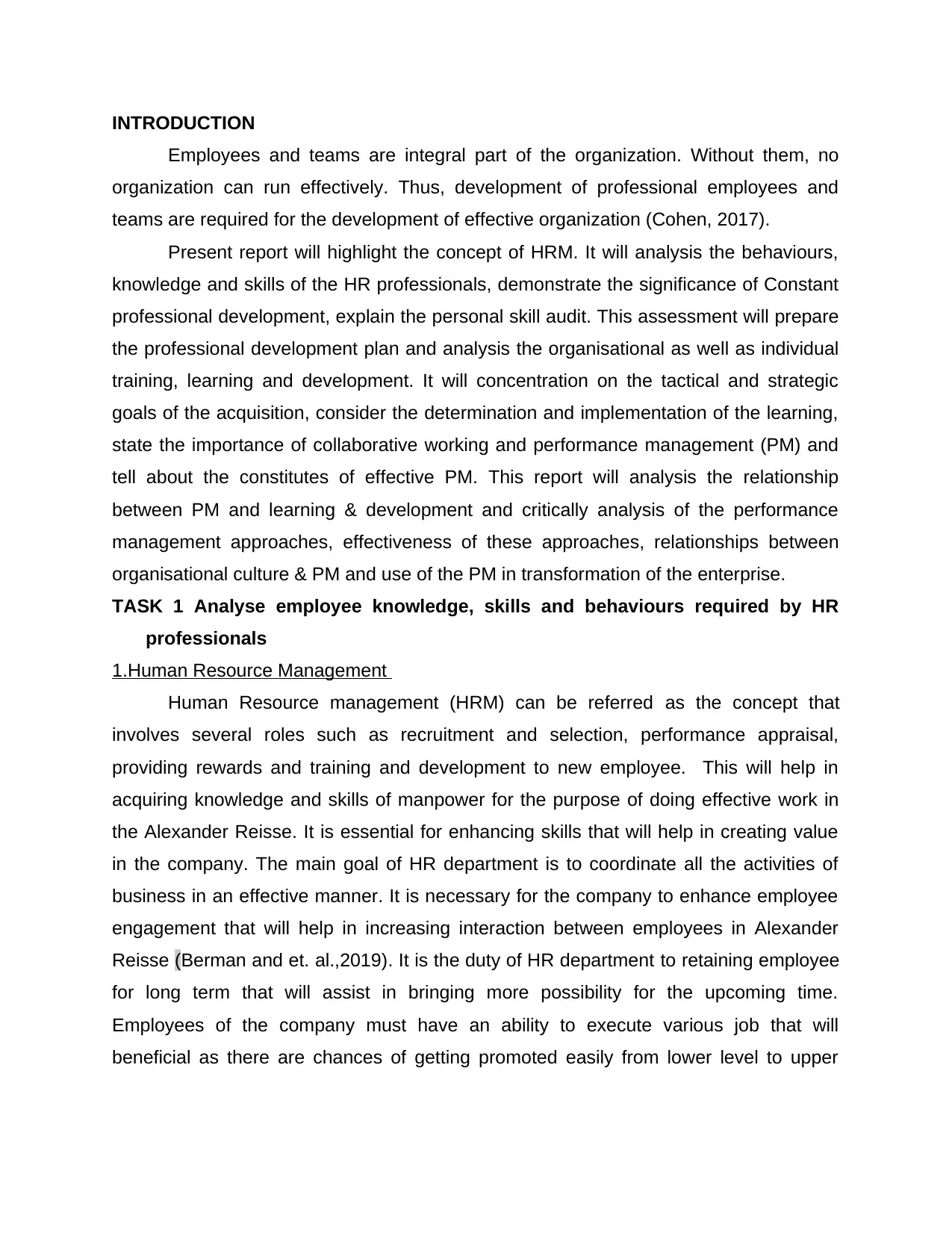
INTRODUCTION
Employees and teams are integral part of the organization. Without them, no
organization can run effectively. Thus, development of professional employees and
teams are required for the development of effective organization (Cohen, 2017).
Present report will highlight the concept of HRM. It will analysis the behaviours,
knowledge and skills of the HR professionals, demonstrate the significance of Constant
professional development, explain the personal skill audit. This assessment will prepare
the professional development plan and analysis the organisational as well as individual
training, learning and development. It will concentration on the tactical and strategic
goals of the acquisition, consider the determination and implementation of the learning,
state the importance of collaborative working and performance management (PM) and
tell about the constitutes of effective PM. This report will analysis the relationship
between PM and learning & development and critically analysis of the performance
management approaches, effectiveness of these approaches, relationships between
organisational culture & PM and use of the PM in transformation of the enterprise.
TASK 1 Analyse employee knowledge, skills and behaviours required by HR
professionals
1.Human Resource Management
Human Resource management (HRM) can be referred as the concept that
involves several roles such as recruitment and selection, performance appraisal,
providing rewards and training and development to new employee. This will help in
acquiring knowledge and skills of manpower for the purpose of doing effective work in
the Alexander Reisse. It is essential for enhancing skills that will help in creating value
in the company. The main goal of HR department is to coordinate all the activities of
business in an effective manner. It is necessary for the company to enhance employee
engagement that will help in increasing interaction between employees in Alexander
Reisse (Berman and et. al.,2019). It is the duty of HR department to retaining employee
for long term that will assist in bringing more possibility for the upcoming time.
Employees of the company must have an ability to execute various job that will
beneficial as there are chances of getting promoted easily from lower level to upper
Employees and teams are integral part of the organization. Without them, no
organization can run effectively. Thus, development of professional employees and
teams are required for the development of effective organization (Cohen, 2017).
Present report will highlight the concept of HRM. It will analysis the behaviours,
knowledge and skills of the HR professionals, demonstrate the significance of Constant
professional development, explain the personal skill audit. This assessment will prepare
the professional development plan and analysis the organisational as well as individual
training, learning and development. It will concentration on the tactical and strategic
goals of the acquisition, consider the determination and implementation of the learning,
state the importance of collaborative working and performance management (PM) and
tell about the constitutes of effective PM. This report will analysis the relationship
between PM and learning & development and critically analysis of the performance
management approaches, effectiveness of these approaches, relationships between
organisational culture & PM and use of the PM in transformation of the enterprise.
TASK 1 Analyse employee knowledge, skills and behaviours required by HR
professionals
1.Human Resource Management
Human Resource management (HRM) can be referred as the concept that
involves several roles such as recruitment and selection, performance appraisal,
providing rewards and training and development to new employee. This will help in
acquiring knowledge and skills of manpower for the purpose of doing effective work in
the Alexander Reisse. It is essential for enhancing skills that will help in creating value
in the company. The main goal of HR department is to coordinate all the activities of
business in an effective manner. It is necessary for the company to enhance employee
engagement that will help in increasing interaction between employees in Alexander
Reisse (Berman and et. al.,2019). It is the duty of HR department to retaining employee
for long term that will assist in bringing more possibility for the upcoming time.
Employees of the company must have an ability to execute various job that will
beneficial as there are chances of getting promoted easily from lower level to upper
Paraphrase This Document
Need a fresh take? Get an instant paraphrase of this document with our AI Paraphraser
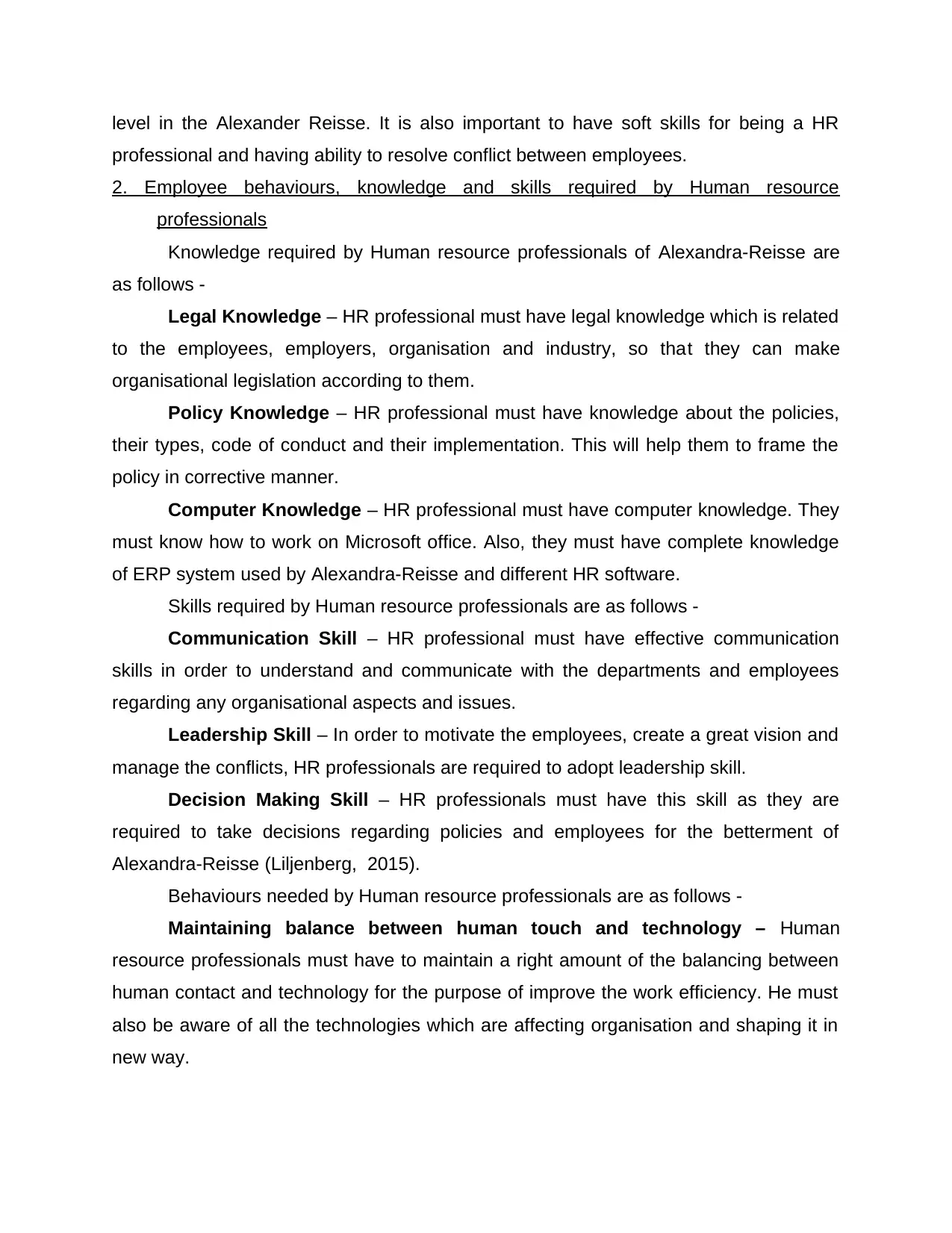
level in the Alexander Reisse. It is also important to have soft skills for being a HR
professional and having ability to resolve conflict between employees.
2. Employee behaviours, knowledge and skills required by Human resource
professionals
Knowledge required by Human resource professionals of Alexandra-Reisse are
as follows -
Legal Knowledge – HR professional must have legal knowledge which is related
to the employees, employers, organisation and industry, so that they can make
organisational legislation according to them.
Policy Knowledge – HR professional must have knowledge about the policies,
their types, code of conduct and their implementation. This will help them to frame the
policy in corrective manner.
Computer Knowledge – HR professional must have computer knowledge. They
must know how to work on Microsoft office. Also, they must have complete knowledge
of ERP system used by Alexandra-Reisse and different HR software.
Skills required by Human resource professionals are as follows -
Communication Skill – HR professional must have effective communication
skills in order to understand and communicate with the departments and employees
regarding any organisational aspects and issues.
Leadership Skill – In order to motivate the employees, create a great vision and
manage the conflicts, HR professionals are required to adopt leadership skill.
Decision Making Skill – HR professionals must have this skill as they are
required to take decisions regarding policies and employees for the betterment of
Alexandra-Reisse (Liljenberg, 2015).
Behaviours needed by Human resource professionals are as follows -
Maintaining balance between human touch and technology – Human
resource professionals must have to maintain a right amount of the balancing between
human contact and technology for the purpose of improve the work efficiency. He must
also be aware of all the technologies which are affecting organisation and shaping it in
new way.
professional and having ability to resolve conflict between employees.
2. Employee behaviours, knowledge and skills required by Human resource
professionals
Knowledge required by Human resource professionals of Alexandra-Reisse are
as follows -
Legal Knowledge – HR professional must have legal knowledge which is related
to the employees, employers, organisation and industry, so that they can make
organisational legislation according to them.
Policy Knowledge – HR professional must have knowledge about the policies,
their types, code of conduct and their implementation. This will help them to frame the
policy in corrective manner.
Computer Knowledge – HR professional must have computer knowledge. They
must know how to work on Microsoft office. Also, they must have complete knowledge
of ERP system used by Alexandra-Reisse and different HR software.
Skills required by Human resource professionals are as follows -
Communication Skill – HR professional must have effective communication
skills in order to understand and communicate with the departments and employees
regarding any organisational aspects and issues.
Leadership Skill – In order to motivate the employees, create a great vision and
manage the conflicts, HR professionals are required to adopt leadership skill.
Decision Making Skill – HR professionals must have this skill as they are
required to take decisions regarding policies and employees for the betterment of
Alexandra-Reisse (Liljenberg, 2015).
Behaviours needed by Human resource professionals are as follows -
Maintaining balance between human touch and technology – Human
resource professionals must have to maintain a right amount of the balancing between
human contact and technology for the purpose of improve the work efficiency. He must
also be aware of all the technologies which are affecting organisation and shaping it in
new way.
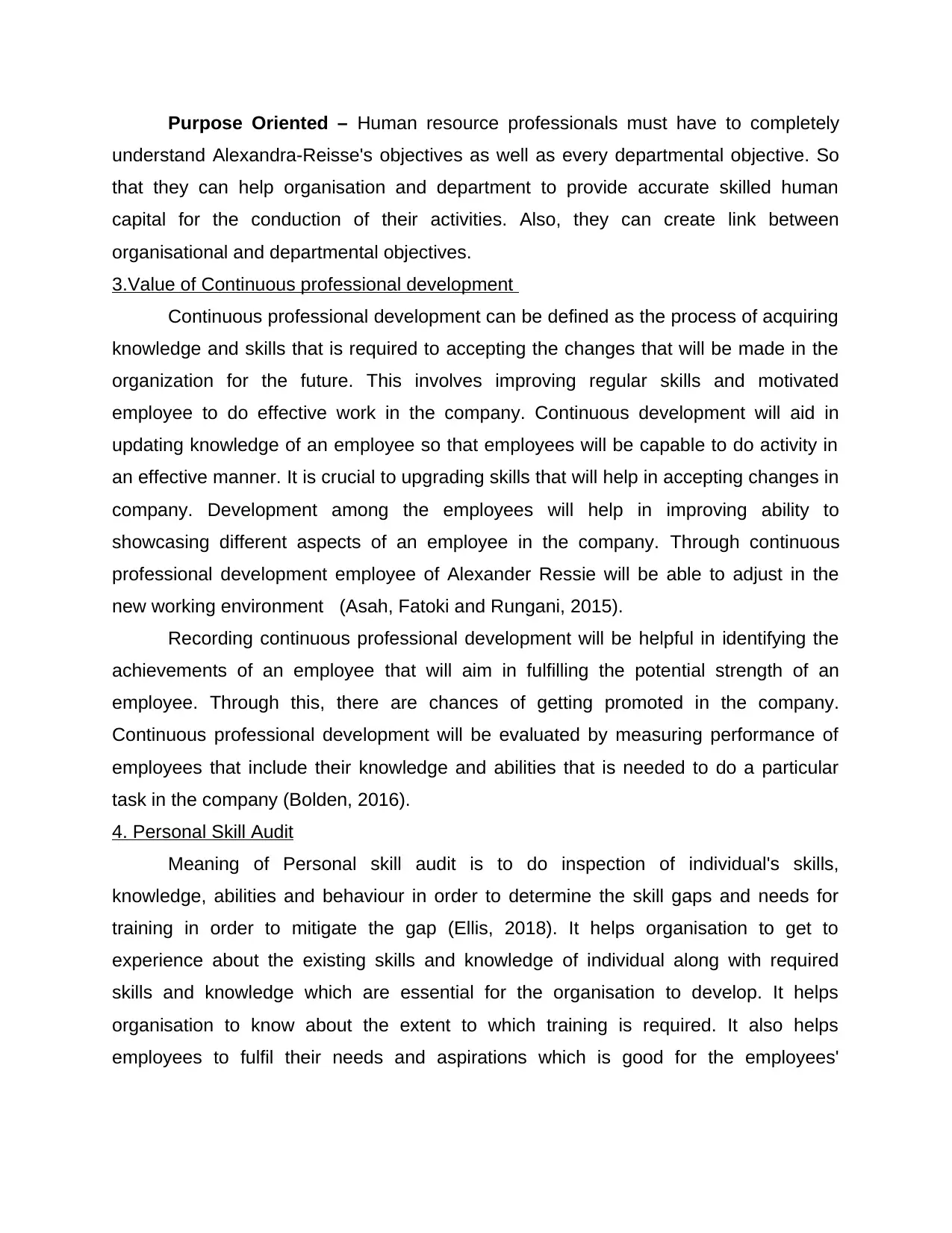
Purpose Oriented – Human resource professionals must have to completely
understand Alexandra-Reisse's objectives as well as every departmental objective. So
that they can help organisation and department to provide accurate skilled human
capital for the conduction of their activities. Also, they can create link between
organisational and departmental objectives.
3.Value of Continuous professional development
Continuous professional development can be defined as the process of acquiring
knowledge and skills that is required to accepting the changes that will be made in the
organization for the future. This involves improving regular skills and motivated
employee to do effective work in the company. Continuous development will aid in
updating knowledge of an employee so that employees will be capable to do activity in
an effective manner. It is crucial to upgrading skills that will help in accepting changes in
company. Development among the employees will help in improving ability to
showcasing different aspects of an employee in the company. Through continuous
professional development employee of Alexander Ressie will be able to adjust in the
new working environment (Asah, Fatoki and Rungani, 2015).
Recording continuous professional development will be helpful in identifying the
achievements of an employee that will aim in fulfilling the potential strength of an
employee. Through this, there are chances of getting promoted in the company.
Continuous professional development will be evaluated by measuring performance of
employees that include their knowledge and abilities that is needed to do a particular
task in the company (Bolden, 2016).
4. Personal Skill Audit
Meaning of Personal skill audit is to do inspection of individual's skills,
knowledge, abilities and behaviour in order to determine the skill gaps and needs for
training in order to mitigate the gap (Ellis, 2018). It helps organisation to get to
experience about the existing skills and knowledge of individual along with required
skills and knowledge which are essential for the organisation to develop. It helps
organisation to know about the extent to which training is required. It also helps
employees to fulfil their needs and aspirations which is good for the employees'
understand Alexandra-Reisse's objectives as well as every departmental objective. So
that they can help organisation and department to provide accurate skilled human
capital for the conduction of their activities. Also, they can create link between
organisational and departmental objectives.
3.Value of Continuous professional development
Continuous professional development can be defined as the process of acquiring
knowledge and skills that is required to accepting the changes that will be made in the
organization for the future. This involves improving regular skills and motivated
employee to do effective work in the company. Continuous development will aid in
updating knowledge of an employee so that employees will be capable to do activity in
an effective manner. It is crucial to upgrading skills that will help in accepting changes in
company. Development among the employees will help in improving ability to
showcasing different aspects of an employee in the company. Through continuous
professional development employee of Alexander Ressie will be able to adjust in the
new working environment (Asah, Fatoki and Rungani, 2015).
Recording continuous professional development will be helpful in identifying the
achievements of an employee that will aim in fulfilling the potential strength of an
employee. Through this, there are chances of getting promoted in the company.
Continuous professional development will be evaluated by measuring performance of
employees that include their knowledge and abilities that is needed to do a particular
task in the company (Bolden, 2016).
4. Personal Skill Audit
Meaning of Personal skill audit is to do inspection of individual's skills,
knowledge, abilities and behaviour in order to determine the skill gaps and needs for
training in order to mitigate the gap (Ellis, 2018). It helps organisation to get to
experience about the existing skills and knowledge of individual along with required
skills and knowledge which are essential for the organisation to develop. It helps
organisation to know about the extent to which training is required. It also helps
employees to fulfil their needs and aspirations which is good for the employees'
⊘ This is a preview!⊘
Do you want full access?
Subscribe today to unlock all pages.

Trusted by 1+ million students worldwide
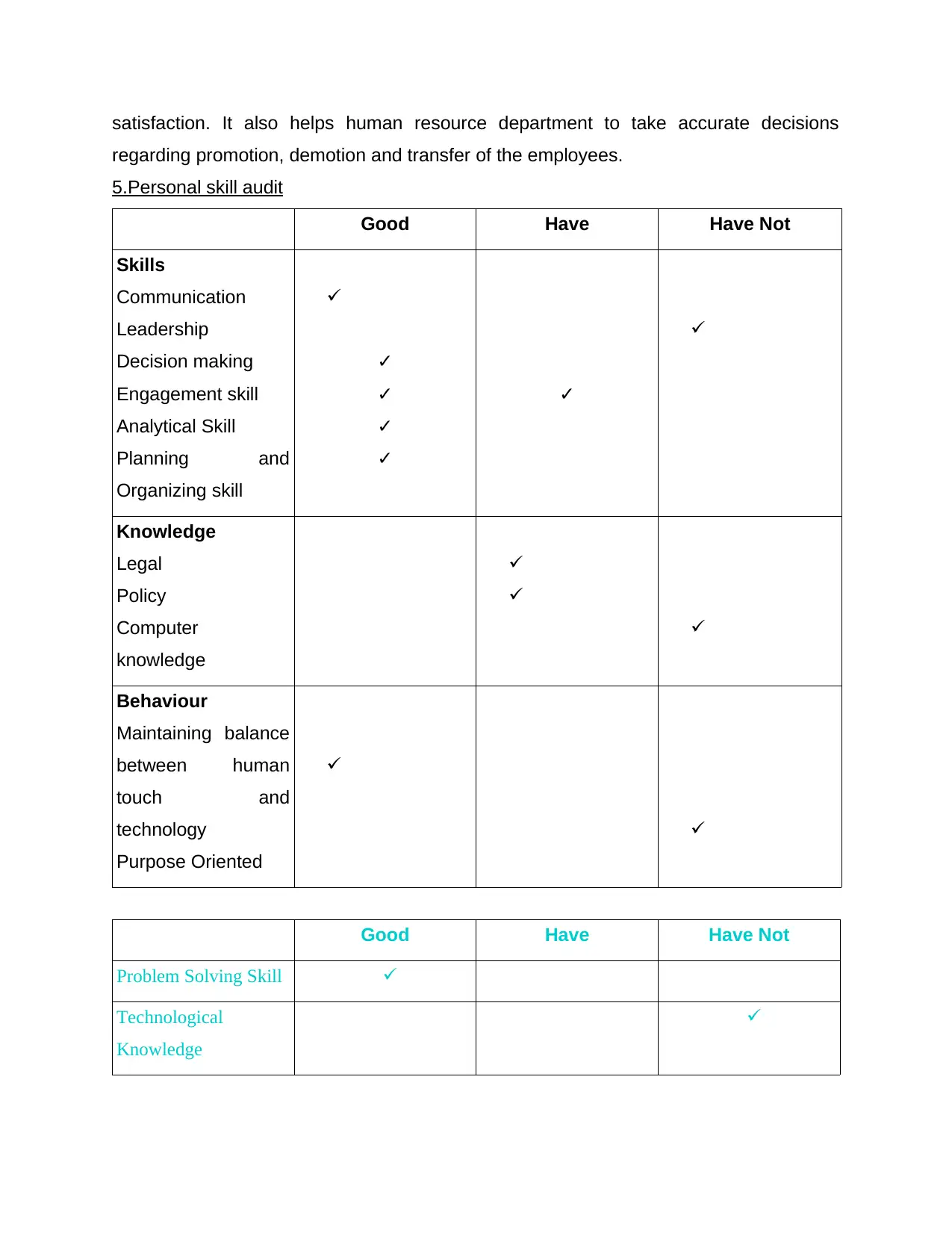
satisfaction. It also helps human resource department to take accurate decisions
regarding promotion, demotion and transfer of the employees.
5.Personal skill audit
Good Have Have Not
Skills
Communication
Leadership
Decision making
Engagement skill
Analytical Skill
Planning and
Organizing skill
✓
✓
✓
✓
✓
Knowledge
Legal
Policy
Computer
knowledge
Behaviour
Maintaining balance
between human
touch and
technology
Purpose Oriented
Good Have Have Not
Problem Solving Skill
Technological
Knowledge
regarding promotion, demotion and transfer of the employees.
5.Personal skill audit
Good Have Have Not
Skills
Communication
Leadership
Decision making
Engagement skill
Analytical Skill
Planning and
Organizing skill
✓
✓
✓
✓
✓
Knowledge
Legal
Policy
Computer
knowledge
Behaviour
Maintaining balance
between human
touch and
technology
Purpose Oriented
Good Have Have Not
Problem Solving Skill
Technological
Knowledge
Paraphrase This Document
Need a fresh take? Get an instant paraphrase of this document with our AI Paraphraser
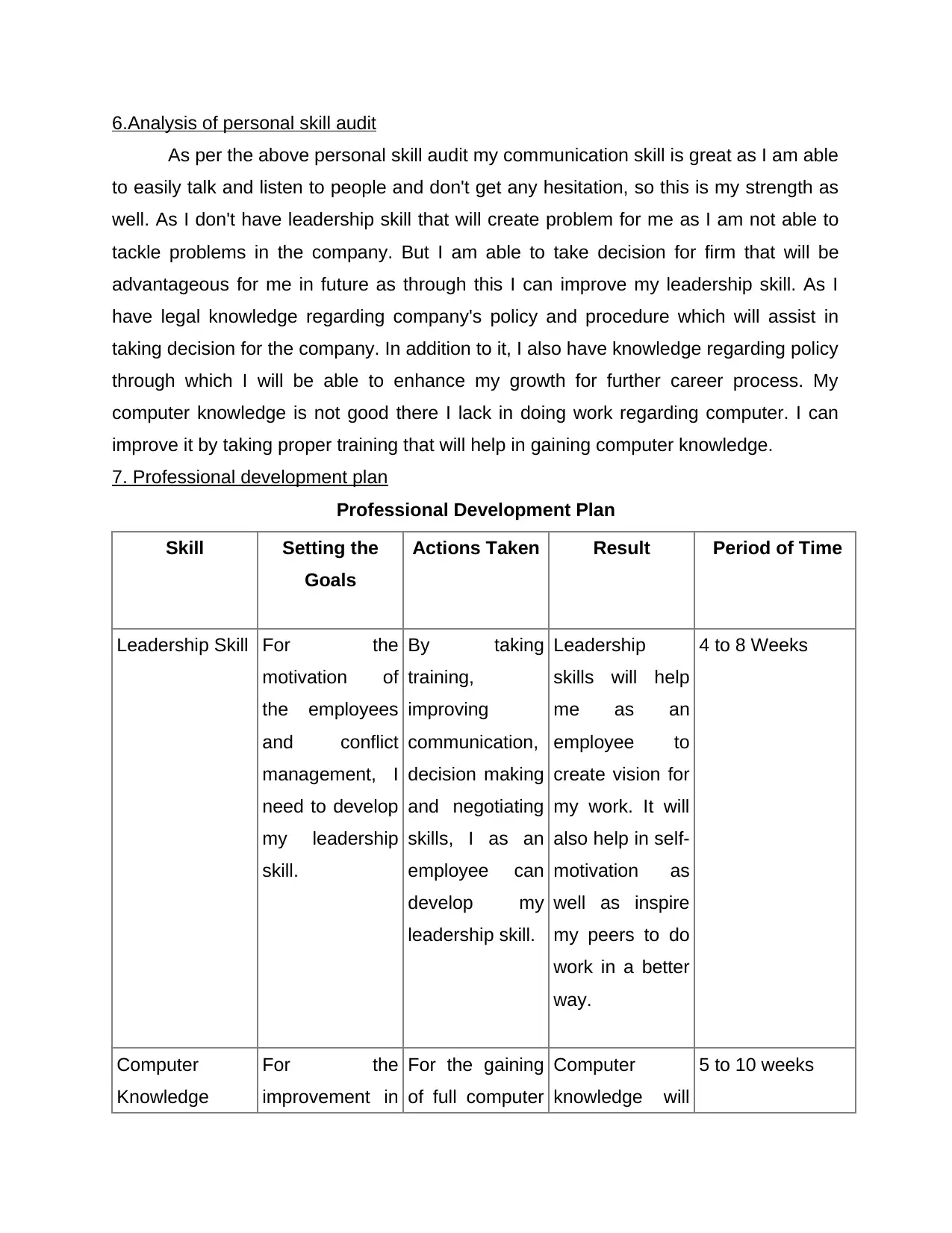
6.Analysis of personal skill audit
As per the above personal skill audit my communication skill is great as I am able
to easily talk and listen to people and don't get any hesitation, so this is my strength as
well. As I don't have leadership skill that will create problem for me as I am not able to
tackle problems in the company. But I am able to take decision for firm that will be
advantageous for me in future as through this I can improve my leadership skill. As I
have legal knowledge regarding company's policy and procedure which will assist in
taking decision for the company. In addition to it, I also have knowledge regarding policy
through which I will be able to enhance my growth for further career process. My
computer knowledge is not good there I lack in doing work regarding computer. I can
improve it by taking proper training that will help in gaining computer knowledge.
7. Professional development plan
Professional Development Plan
Skill Setting the
Goals
Actions Taken Result Period of Time
Leadership Skill For the
motivation of
the employees
and conflict
management, I
need to develop
my leadership
skill.
By taking
training,
improving
communication,
decision making
and negotiating
skills, I as an
employee can
develop my
leadership skill.
Leadership
skills will help
me as an
employee to
create vision for
my work. It will
also help in self-
motivation as
well as inspire
my peers to do
work in a better
way.
4 to 8 Weeks
Computer
Knowledge
For the
improvement in
For the gaining
of full computer
Computer
knowledge will
5 to 10 weeks
As per the above personal skill audit my communication skill is great as I am able
to easily talk and listen to people and don't get any hesitation, so this is my strength as
well. As I don't have leadership skill that will create problem for me as I am not able to
tackle problems in the company. But I am able to take decision for firm that will be
advantageous for me in future as through this I can improve my leadership skill. As I
have legal knowledge regarding company's policy and procedure which will assist in
taking decision for the company. In addition to it, I also have knowledge regarding policy
through which I will be able to enhance my growth for further career process. My
computer knowledge is not good there I lack in doing work regarding computer. I can
improve it by taking proper training that will help in gaining computer knowledge.
7. Professional development plan
Professional Development Plan
Skill Setting the
Goals
Actions Taken Result Period of Time
Leadership Skill For the
motivation of
the employees
and conflict
management, I
need to develop
my leadership
skill.
By taking
training,
improving
communication,
decision making
and negotiating
skills, I as an
employee can
develop my
leadership skill.
Leadership
skills will help
me as an
employee to
create vision for
my work. It will
also help in self-
motivation as
well as inspire
my peers to do
work in a better
way.
4 to 8 Weeks
Computer
Knowledge
For the
improvement in
For the gaining
of full computer
Computer
knowledge will
5 to 10 weeks
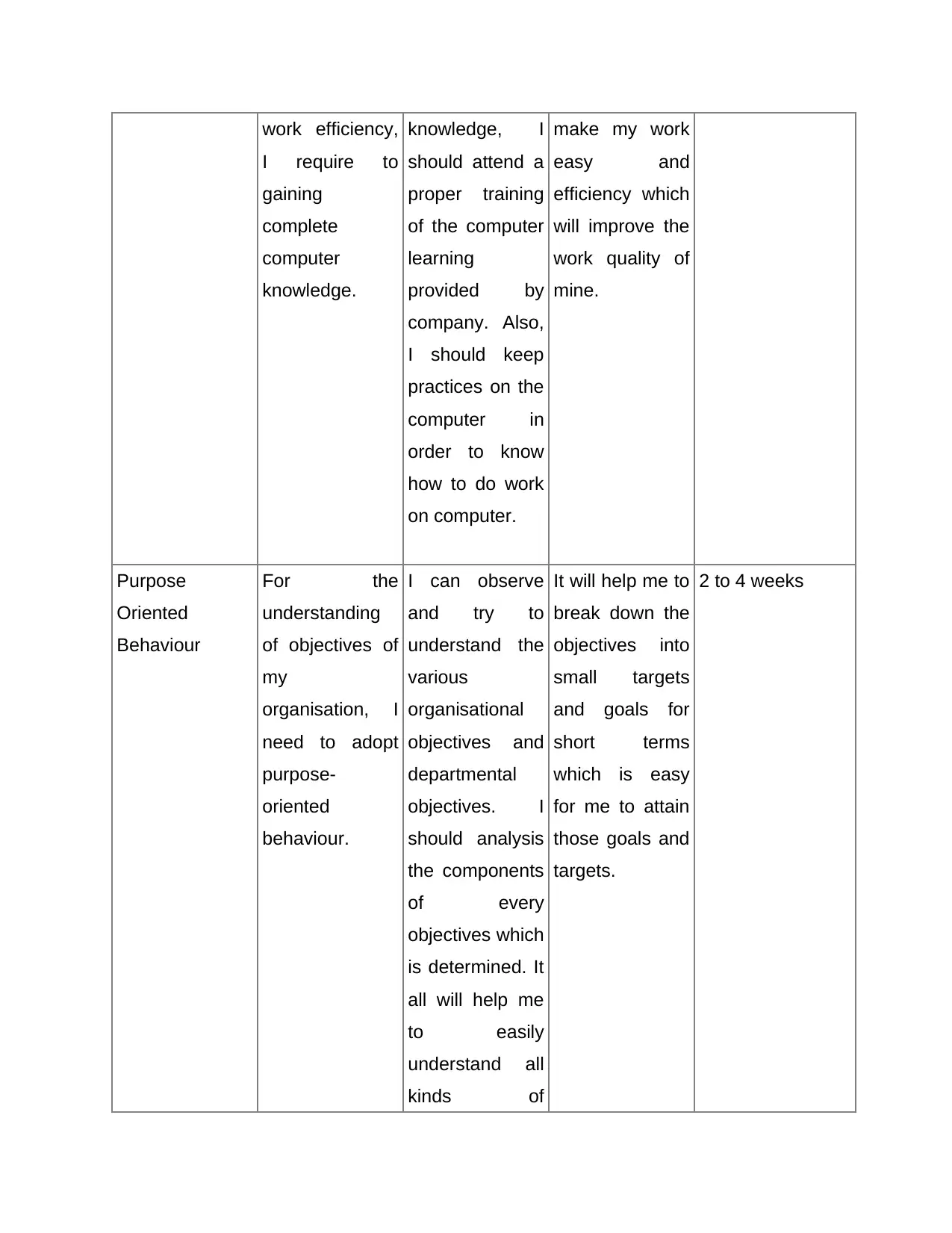
work efficiency,
I require to
gaining
complete
computer
knowledge.
knowledge, I
should attend a
proper training
of the computer
learning
provided by
company. Also,
I should keep
practices on the
computer in
order to know
how to do work
on computer.
make my work
easy and
efficiency which
will improve the
work quality of
mine.
Purpose
Oriented
Behaviour
For the
understanding
of objectives of
my
organisation, I
need to adopt
purpose-
oriented
behaviour.
I can observe
and try to
understand the
various
organisational
objectives and
departmental
objectives. I
should analysis
the components
of every
objectives which
is determined. It
all will help me
to easily
understand all
kinds of
It will help me to
break down the
objectives into
small targets
and goals for
short terms
which is easy
for me to attain
those goals and
targets.
2 to 4 weeks
I require to
gaining
complete
computer
knowledge.
knowledge, I
should attend a
proper training
of the computer
learning
provided by
company. Also,
I should keep
practices on the
computer in
order to know
how to do work
on computer.
make my work
easy and
efficiency which
will improve the
work quality of
mine.
Purpose
Oriented
Behaviour
For the
understanding
of objectives of
my
organisation, I
need to adopt
purpose-
oriented
behaviour.
I can observe
and try to
understand the
various
organisational
objectives and
departmental
objectives. I
should analysis
the components
of every
objectives which
is determined. It
all will help me
to easily
understand all
kinds of
It will help me to
break down the
objectives into
small targets
and goals for
short terms
which is easy
for me to attain
those goals and
targets.
2 to 4 weeks
⊘ This is a preview!⊘
Do you want full access?
Subscribe today to unlock all pages.

Trusted by 1+ million students worldwide
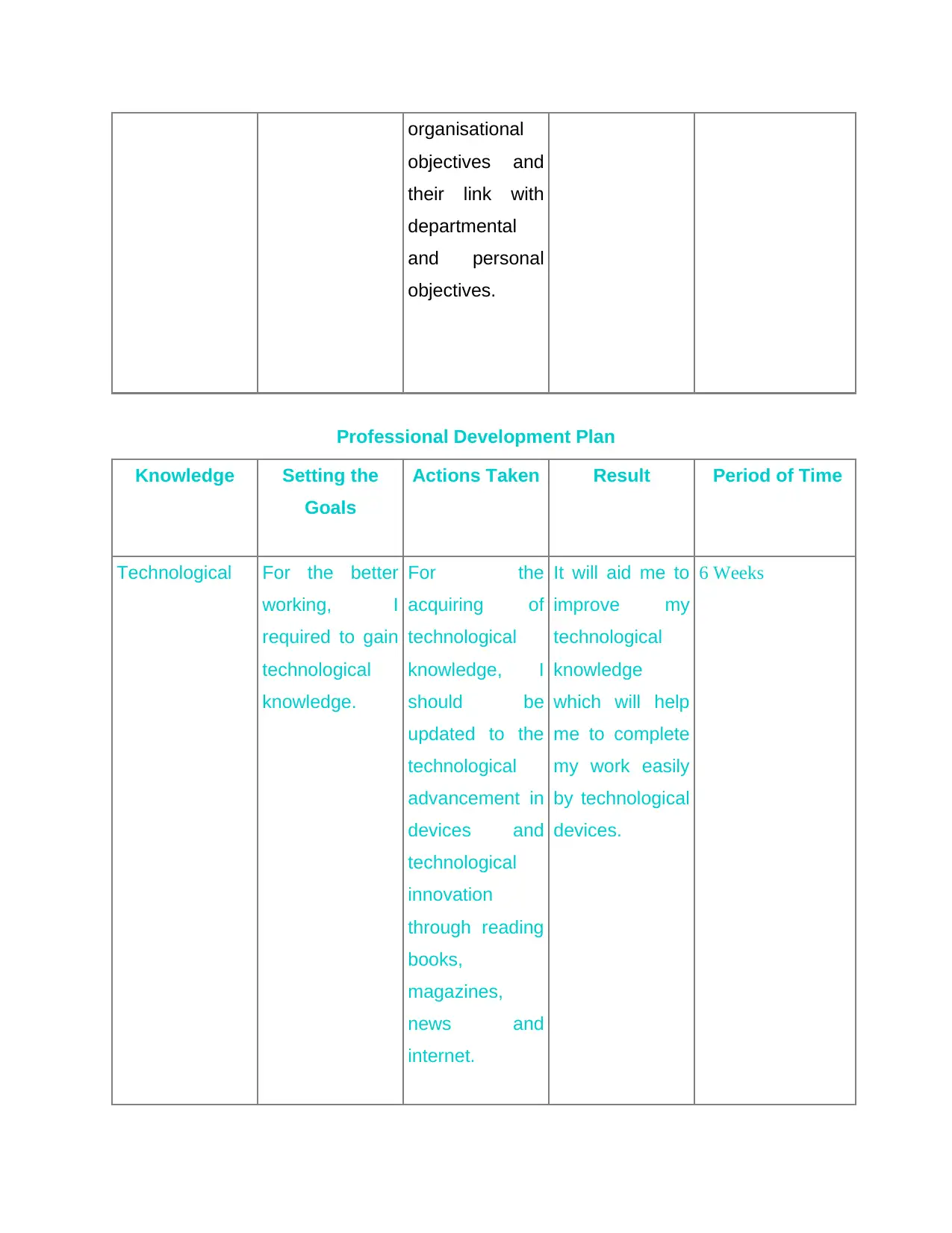
organisational
objectives and
their link with
departmental
and personal
objectives.
Professional Development Plan
Knowledge Setting the
Goals
Actions Taken Result Period of Time
Technological For the better
working, I
required to gain
technological
knowledge.
For the
acquiring of
technological
knowledge, I
should be
updated to the
technological
advancement in
devices and
technological
innovation
through reading
books,
magazines,
news and
internet.
It will aid me to
improve my
technological
knowledge
which will help
me to complete
my work easily
by technological
devices.
6 Weeks
objectives and
their link with
departmental
and personal
objectives.
Professional Development Plan
Knowledge Setting the
Goals
Actions Taken Result Period of Time
Technological For the better
working, I
required to gain
technological
knowledge.
For the
acquiring of
technological
knowledge, I
should be
updated to the
technological
advancement in
devices and
technological
innovation
through reading
books,
magazines,
news and
internet.
It will aid me to
improve my
technological
knowledge
which will help
me to complete
my work easily
by technological
devices.
6 Weeks
Paraphrase This Document
Need a fresh take? Get an instant paraphrase of this document with our AI Paraphraser
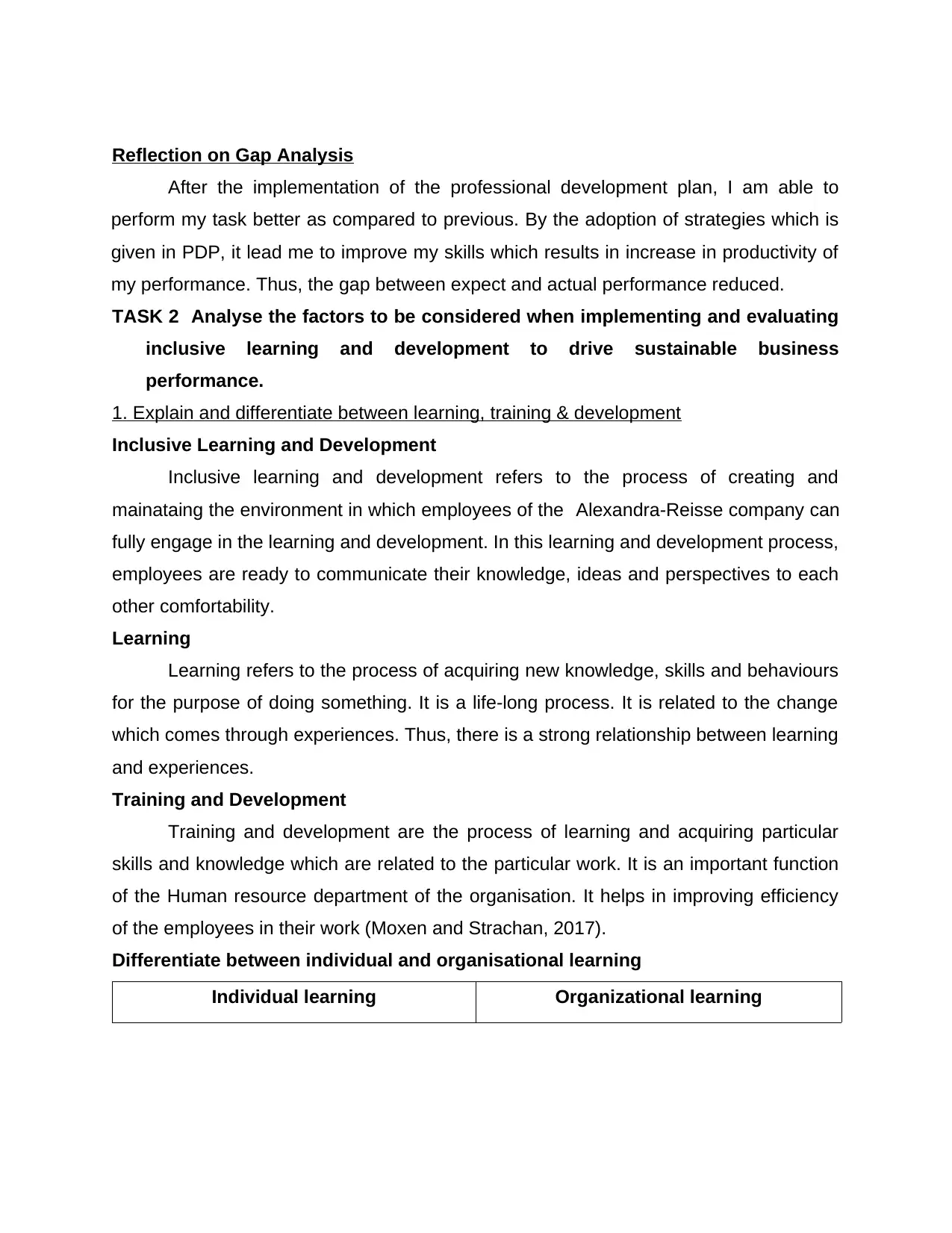
Reflection on Gap Analysis
After the implementation of the professional development plan, I am able to
perform my task better as compared to previous. By the adoption of strategies which is
given in PDP, it lead me to improve my skills which results in increase in productivity of
my performance. Thus, the gap between expect and actual performance reduced.
TASK 2 Analyse the factors to be considered when implementing and evaluating
inclusive learning and development to drive sustainable business
performance.
1. Explain and differentiate between learning, training & development
Inclusive Learning and Development
Inclusive learning and development refers to the process of creating and
mainataing the environment in which employees of the Alexandra-Reisse company can
fully engage in the learning and development. In this learning and development process,
employees are ready to communicate their knowledge, ideas and perspectives to each
other comfortability.
Learning
Learning refers to the process of acquiring new knowledge, skills and behaviours
for the purpose of doing something. It is a life-long process. It is related to the change
which comes through experiences. Thus, there is a strong relationship between learning
and experiences.
Training and Development
Training and development are the process of learning and acquiring particular
skills and knowledge which are related to the particular work. It is an important function
of the Human resource department of the organisation. It helps in improving efficiency
of the employees in their work (Moxen and Strachan, 2017).
Differentiate between individual and organisational learning
Individual learning Organizational learning
After the implementation of the professional development plan, I am able to
perform my task better as compared to previous. By the adoption of strategies which is
given in PDP, it lead me to improve my skills which results in increase in productivity of
my performance. Thus, the gap between expect and actual performance reduced.
TASK 2 Analyse the factors to be considered when implementing and evaluating
inclusive learning and development to drive sustainable business
performance.
1. Explain and differentiate between learning, training & development
Inclusive Learning and Development
Inclusive learning and development refers to the process of creating and
mainataing the environment in which employees of the Alexandra-Reisse company can
fully engage in the learning and development. In this learning and development process,
employees are ready to communicate their knowledge, ideas and perspectives to each
other comfortability.
Learning
Learning refers to the process of acquiring new knowledge, skills and behaviours
for the purpose of doing something. It is a life-long process. It is related to the change
which comes through experiences. Thus, there is a strong relationship between learning
and experiences.
Training and Development
Training and development are the process of learning and acquiring particular
skills and knowledge which are related to the particular work. It is an important function
of the Human resource department of the organisation. It helps in improving efficiency
of the employees in their work (Moxen and Strachan, 2017).
Differentiate between individual and organisational learning
Individual learning Organizational learning
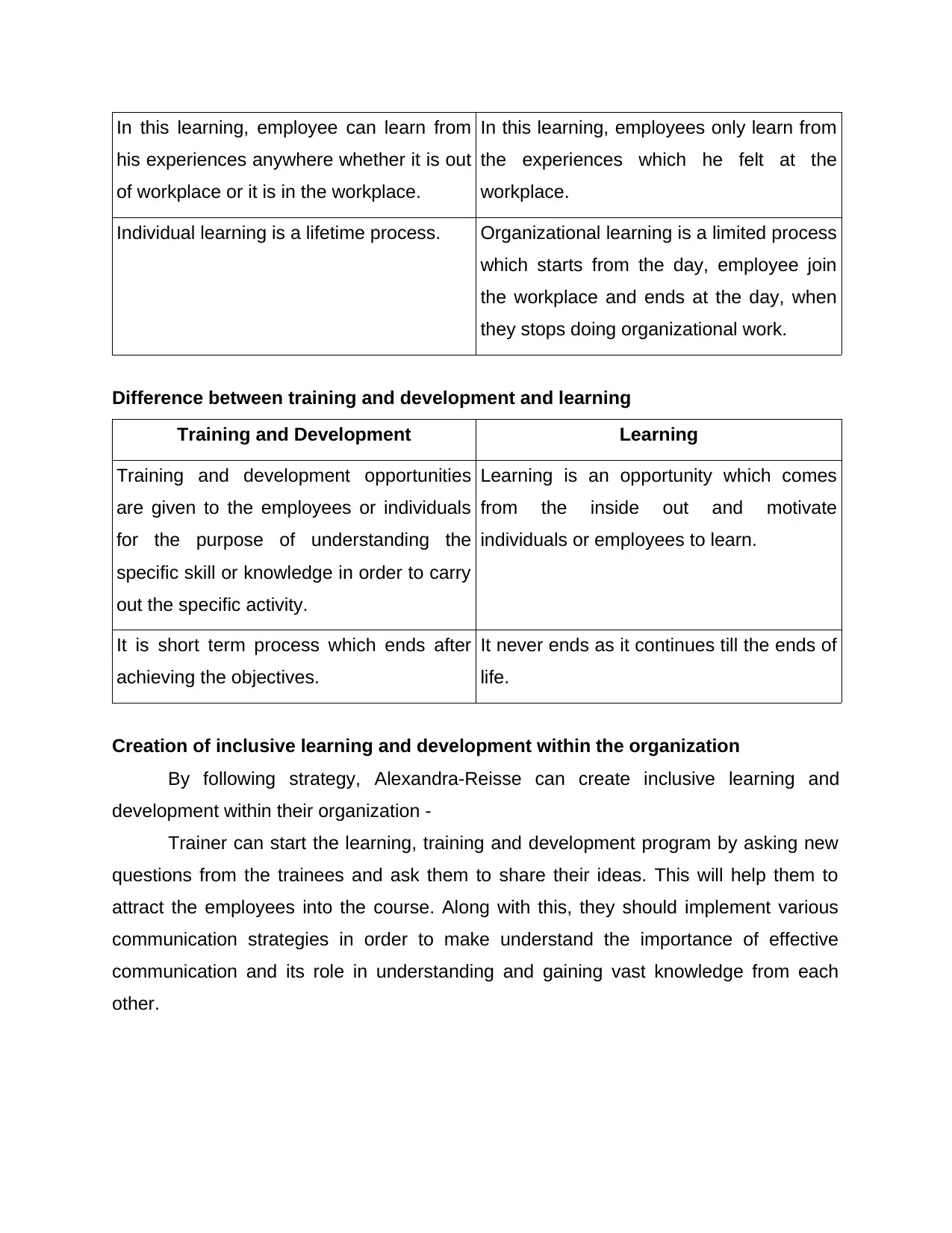
In this learning, employee can learn from
his experiences anywhere whether it is out
of workplace or it is in the workplace.
In this learning, employees only learn from
the experiences which he felt at the
workplace.
Individual learning is a lifetime process. Organizational learning is a limited process
which starts from the day, employee join
the workplace and ends at the day, when
they stops doing organizational work.
Difference between training and development and learning
Training and Development Learning
Training and development opportunities
are given to the employees or individuals
for the purpose of understanding the
specific skill or knowledge in order to carry
out the specific activity.
Learning is an opportunity which comes
from the inside out and motivate
individuals or employees to learn.
It is short term process which ends after
achieving the objectives.
It never ends as it continues till the ends of
life.
Creation of inclusive learning and development within the organization
By following strategy, Alexandra-Reisse can create inclusive learning and
development within their organization -
Trainer can start the learning, training and development program by asking new
questions from the trainees and ask them to share their ideas. This will help them to
attract the employees into the course. Along with this, they should implement various
communication strategies in order to make understand the importance of effective
communication and its role in understanding and gaining vast knowledge from each
other.
his experiences anywhere whether it is out
of workplace or it is in the workplace.
In this learning, employees only learn from
the experiences which he felt at the
workplace.
Individual learning is a lifetime process. Organizational learning is a limited process
which starts from the day, employee join
the workplace and ends at the day, when
they stops doing organizational work.
Difference between training and development and learning
Training and Development Learning
Training and development opportunities
are given to the employees or individuals
for the purpose of understanding the
specific skill or knowledge in order to carry
out the specific activity.
Learning is an opportunity which comes
from the inside out and motivate
individuals or employees to learn.
It is short term process which ends after
achieving the objectives.
It never ends as it continues till the ends of
life.
Creation of inclusive learning and development within the organization
By following strategy, Alexandra-Reisse can create inclusive learning and
development within their organization -
Trainer can start the learning, training and development program by asking new
questions from the trainees and ask them to share their ideas. This will help them to
attract the employees into the course. Along with this, they should implement various
communication strategies in order to make understand the importance of effective
communication and its role in understanding and gaining vast knowledge from each
other.
⊘ This is a preview!⊘
Do you want full access?
Subscribe today to unlock all pages.

Trusted by 1+ million students worldwide
1 out of 23
Related Documents
Your All-in-One AI-Powered Toolkit for Academic Success.
+13062052269
info@desklib.com
Available 24*7 on WhatsApp / Email
![[object Object]](/_next/static/media/star-bottom.7253800d.svg)
Unlock your academic potential
Copyright © 2020–2026 A2Z Services. All Rights Reserved. Developed and managed by ZUCOL.



